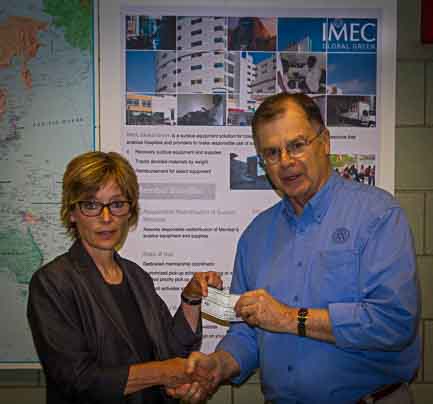Fully funded Mongolian Global Grant approved by RI

maternal and pediatric medical suites to be shipped to clinics in Mongolia.
Mongolian Ambassadorial Scholar Batuka Baterdene had an idea when he came to the states to pursue a degree in city planning at the State University of New York (SUNY) Albany. It was his vision to somehow equip five rural clinics with the basic medical equipment they needed to provide necessary care to expectant mothers and their infants in villages that were hundreds of miles from the nearest hospital. Batuka made a presentation, with a series of compelling videos taken by two expat members of the Ulaanbaatar Rotary Club, that demonstrated the desperate need at a forum in Massachusetts called Rotary Northeast Link. Link was organized a number of years ago by Past District Governor Karen Babbin to provide a basic Rotary and cultural awareness education to incoming and outgoing Ambassadorial Scholars and for outgoing Group Study Exchange Teams - none of whom were Rotarians.
I was attending Link as a District Governor and as a previous attendee and member of the committee. Batuka's presentation struck a chord with me as a very worthwhile cause. I spoke to him after the presentation and said that I'd like to help, but it would have to be after my District Governor year ended in July 2013. With the help of the videos, we put together a presentation and took it to as many Rotary clubs as possible through the summer and into the fall and winter. A District Governor classmate gave us press in her adjoining district. It turned out that several years before a Group Study Exchange Team, headed by Rotarian Dr. Burt Dibble, visited the District which included Mongolia, and he was ready to help with the fund raising.
Batuka traveled back to Mongolia in December. We continued to communicate using Skype, email, text and Facetime. Batuka found us a club partner at Ulaanbaatar Peace Avenue. Every member gave to the project. They worked through the Ulaanbaatar club to secure the necessary Memos of Understanding from the government saying that this donation would not be taxed; from the Medical University saying that they would provide training for a representative at each clinic; and from the clinics themselves, assuring that they understood the equipment was only to be used for its intended purpose. Meanwhile the equipment list was being refined to fit the environment. The only high-tech equipment items are the sonograms (solid state - two laptop sized units), the infant fetal heart monitors and, to a lesser extent, the incubators. Particular attention is being paid to the local power sources; power conditioning equipment is used to protect the sensitive equipment. LED lighting gets around the problem of burned-out bulbs and the sterilizers are non-electrified "Pot Sterilizers" - any heat source will do. Almost all of the durable equipment is mechanical to eliminate specialized repair should it be damaged or broken. IMEC (International Medical Equipment Consortium) will have put together almost $800,000 in equipment and supplies in the five suites that will be shipped.
The biggest challenge will be the weather and delivery time. IMEC will take some time to assemble all the hundreds of pieces that make up the suites. Shipping in a 40-foot container to Ulaanbaatar will take a minimum of 72 days. In past years it has snowed in August - we're all hoping that the first snow is late. When the equipment arrives in UB, a representative of each of the clinics will be brought in for a one-day training session. Some may have to travel as much as 1700 miles. After a refresher course on the equipment (all medical professionals are trained at the university in UB), each will accompany their equipment back to their clinic.
There are lots of moving pieces to a grant like this, but with the help of dedicated and engaged Rotarians, it gets done.
Tony Gilmore, PDG
Capital City Sunrise Rotary Club